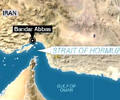

Iran officially inaugurated its new $2 billion exports terminal by loading 300,000 barrels on an oil tanker off the Sea of Oman, enabling the sanction-hit country to bypass the Strait of Hormuz for oil exports.
“For the first time in the over 110 year history of Iran’s oil, crude oil export operations start from Mokran shores in the Sea of Oman,” the oil minister Bijan Zanganeh said in the televised ceremony.
“The 1,000 km, 42-inch pipeline can carry heavy and medium crude oil from Goureh in the Bushehr province to Jask in the Hormozgan province,” Zanganeh said.
Zanganeh said the current capacity of the Goureh-Jask pipeline was 300,000 b/d and will be completed to reach 1 million b/d phase by phase.
“Because of the sanctions, the impossibility of provision of electro-pumps and… pipes brought the project to a dead end. But with help of domestic manufacturers, we could remove this problem and locally build them for the first time in the country,” Zanganeh said.
Iran had accelerated construction of the pipeline in order to secure its oil shipments amid a heightening of tensions in the Persian Gulf with regional rivals Saudi Arabia and Israel, which oppose the US’ willingness to reinstate the Iran nuclear deal and relax sanctions.
The route allows Iran to bypass the Strait of Hormuz, a key chokepoint for oil and gas tankers traversing the Persian Gulf, which is a source of military tensions between the US and Iran and has seen several attacks on oil vessels in the last few years.
President Hassan Rouhani congratulated the “historic day, when Iran could rid of dependence on the single oil terminal which was Kharg.”
“Today, whenever Iran sees it necessary, it will carry out oil exports from the Sea of Oman,” the president said.
“It will take a longer time at Kharg oil terminal for loading. The Persian Gulf has its own issues and problems. But time and strategic issues are important for us,” Rouhani added.
“When the enemy wanted to wage an economic war against us, they basically started it in two fields. One in the oil sector, exports of oil and the second in the field of banking and money transfer … these were among those with highest impacts and they had counted on them.”
“They assumed when they disrupt the oil industry which is the engine of Iran’s economy and fully block oil exports and reduce it to zero, Iran will not be able to use the petrodollars to provide its requirements,” Rouhani said in his inauguration speech.
The Goureh-Jask project had seen 82% progress, Zanganeh said, adding that Pars Oil and Gas Co. was in charge of loading and exporting crude oil from Jask.
“The operations will be completely handed over to the state-run Iranian Oil Terminals Co.,” Zanganeh said.
An Aframax vessel was loading crude off the Jask port, managing director of POGC Mohammad Meshkinfam said, quoted by oil ministry-run news service Shana.
“The 100,000 mt or 700 barrel vessel is connected to SPM and so far has loaded 50,000 mt of crude oil or 300,000 barrels and it will sail towards exports destination,” Meshkinfam said.
Source: Platts